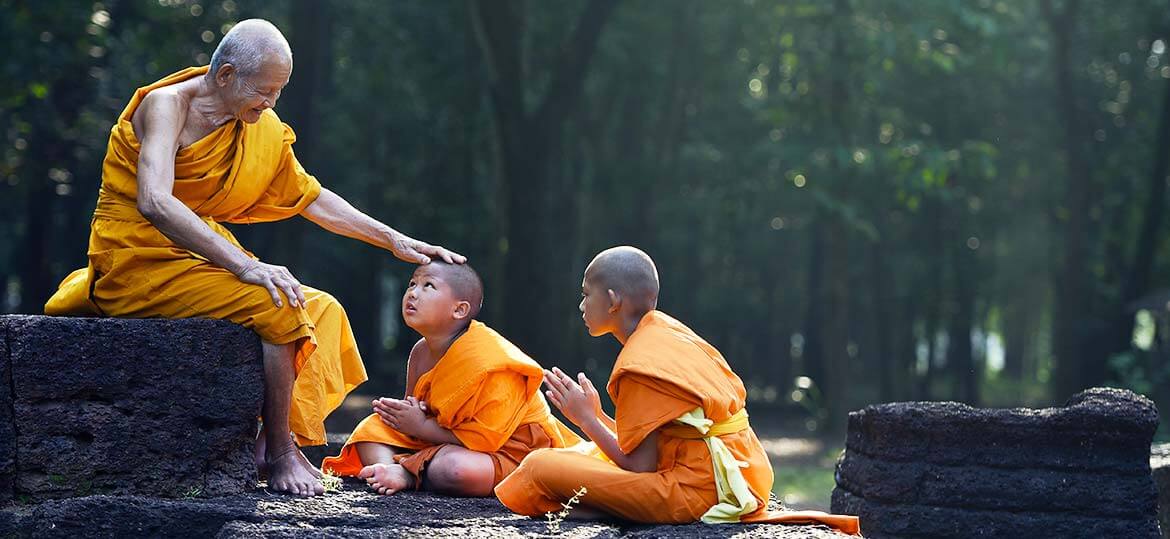 Thai Culture
Thai Culture
"The thing that costs the least and does the most is a pleasant smile". It is a simple quote however one that speaks volumes and its warm sentiment is one that is echoed in Thailand well known with nickname "The Land of Smiles". It seems to be a fitting nickname as Thailand is viewed throughout the world as a nation comprised of friendly and tolerant people. These traits certainly seem to be reflected both in the philosophy of Buddhism, the very basis of the Thai culture, and in the everyday Thai life itself. Many would also agree that it reflects in Thai lifestyle that tends to be more relaxed lifestyle, especially when compared to the quite contrasting busy world of the West. Keeping this in mind, before your arrival in Thailand, it is good to know a few simple cultural practices. One important travel tip to remember (one that should be adhered to throughout your travels, not just when planning your Thailand excursion) is that you should never assume your common habits and practices are the norms of the rest of the world; keeping this in mind may help spare both yourself and native Thais confusion and embarrassment as you will inevitably be interacting with one another. Some practices/norms accepted within your culture and nation could be viewed in a negative manner and not appreciated by Thais. To start, some basic principles Thais generally adhere to and that you should keep in mind while traveling through Thailand is that there is a great respect for others, the King and Royal Family, religions of all kinds, and the elderly. Below a review of some common Thai practices.
 "Wai" is a form of greeting and a way of showing respect in Thailand. Wai is a noun meaning a gestural form of greeting as well as a verb meaning to greet someone with the gesture of Wai. It is the greeting with folded hands, accompanied by a slight bow. This replaces the handshake, a greeting to which some Thais are not accustomed to. In fact in Thai culture, touching the body of others, especially others’ heads, can be viewed a sign of disrespect. You should never touch anyone on the head as it symbolizes the spirit and soul of a person, the highest point of the body therefore should be respected. The Wai is performed by joining the palms of the hands, fingers pointing upward like in prayer gesture, and tilt your head forward in greeting. It is customary for Thais doing Wai whenever they meet someone and whoever receives the Wai returns the gesture in respect. Traditionally those from lower social grades should extend the Wai first, and bow the head the lowest. Thais usually use the gesture of ‘Wai’ followed by the greeting "Sawasdee", a Thai word that can mean ‘Hello, goodbye or welcome’. Men use the end word "Khrab" when saying Sawasdee; "Sawasdee Khrab"; while the women use "Kha"; "Sawasdee Kha" as a way of showing respect and politeness to the listeners. You will likely first encounter these two greetings upon your arrival to the airport and throughout the rest of your vacation. Thais do appreciate those who understand their culture and reciprocate with equal respect. As Thais smile a lot, and may do so even when they don’t understand what you say. So, if there is confusion as to whether you are understanding each other or nothing is better than returning a smile and a ‘Wai’ them to show respect and generosity (and of course making sure you eventually understand eachother). This will likely help keep to return to the good graces of the Thai. "Sanook" is another Thai word commonly spoken and meaning to ‘enjoy’ or ‘have fun’ or ‘have a great time’. This best reflects the Thai life style of "Sabai sabai" which is a term meaning to live an ‘easy going’ and relaxed’ lifestyle. The term "farang" is something you may hear along your travels, it is a Thai word for foreigners/caucasians and their alienated habits.
"Wai" is a form of greeting and a way of showing respect in Thailand. Wai is a noun meaning a gestural form of greeting as well as a verb meaning to greet someone with the gesture of Wai. It is the greeting with folded hands, accompanied by a slight bow. This replaces the handshake, a greeting to which some Thais are not accustomed to. In fact in Thai culture, touching the body of others, especially others’ heads, can be viewed a sign of disrespect. You should never touch anyone on the head as it symbolizes the spirit and soul of a person, the highest point of the body therefore should be respected. The Wai is performed by joining the palms of the hands, fingers pointing upward like in prayer gesture, and tilt your head forward in greeting. It is customary for Thais doing Wai whenever they meet someone and whoever receives the Wai returns the gesture in respect. Traditionally those from lower social grades should extend the Wai first, and bow the head the lowest. Thais usually use the gesture of ‘Wai’ followed by the greeting "Sawasdee", a Thai word that can mean ‘Hello, goodbye or welcome’. Men use the end word "Khrab" when saying Sawasdee; "Sawasdee Khrab"; while the women use "Kha"; "Sawasdee Kha" as a way of showing respect and politeness to the listeners. You will likely first encounter these two greetings upon your arrival to the airport and throughout the rest of your vacation. Thais do appreciate those who understand their culture and reciprocate with equal respect. As Thais smile a lot, and may do so even when they don’t understand what you say. So, if there is confusion as to whether you are understanding each other or nothing is better than returning a smile and a ‘Wai’ them to show respect and generosity (and of course making sure you eventually understand eachother). This will likely help keep to return to the good graces of the Thai. "Sanook" is another Thai word commonly spoken and meaning to ‘enjoy’ or ‘have fun’ or ‘have a great time’. This best reflects the Thai life style of "Sabai sabai" which is a term meaning to live an ‘easy going’ and relaxed’ lifestyle. The term "farang" is something you may hear along your travels, it is a Thai word for foreigners/caucasians and their alienated habits.



Now that we have touched on some of the common greetings and practices of the Thai people, we will look at some practices that Thais may view as inappropriate and insulting. Public cursing, yelling and inappropriate or threatening gestures. If for instance you are in a conversation with a Thai that could lead to an argument or more tense situation, such as bargaining for a cheaper price, or disagreeing on different points of view, it is suggested that you try not to raise your voice above the normal tone in the conversation. If you raise voice, or worse, they may feel that you disrespect them and might perceive that you are aggressive. A good rule is to keep calm and smile. Using the term "Khor-thot" which means ‘excuse me’ or ‘sorry’ in Thai (even if you think you are in the right) may be helpful in many situations as well. They may reply you with a simple "Mai Pen Rai" meaning ‘never mind’ or ‘don’t mention it’. This will allow you to bring the discussion or situation to a more civil tone.
![]()
Thai people in general are reserved. They are not accustomed to showing their physical affections in public. So, try to avoid excessive overt public displays of affection in public such as kisses and hugs. They may even feel uncomfortable to watch love scenes in a movie when they are with friends or especially with parents and family members. Low-cut dresses and super mini-skirts are considered improper. Aside from when they are on a beach, men usually remain bare-chested as it is considered improper. Inside Buddhist temples or palaces, all visitors are required to wear proper clothes which cover shoulders, arms and legs. Also, understanding the government structure In Thailand will also be helpful.

In Thailand there is the Monarchy, and Thais culturally have a deep love of the Monarch, King Maha Vajiralongkorn, and Royal Family, which are considered sacred and worshiped by most of the population.
You should avoid showing disrespect to the Royal Family, speaking disrespectful regarding them or disrespecting images or effigies of them. Even stepping on a banknote with your feet is an offensive gesture as the note has Thai kings on them. The King is legally considered inviolable and those felt to be offending the dignity of the Monarch could be subjected to legal penalties including up to 15 years of imprisonment. The late King Bhumibol and all members of the Royal Family can be found depicted in murals in many places, with large photos and portraits can be seen in virtually every corner of the country, from the capital to the most remote village in Isaan (the northeast region of Thailand). The flag of Thailand and of the Royal Family, which is yellow in color adorned with the symbol of the Chakri Dynasty, can be found along many roads, bridges, overpasses and at each input port of the city of the Kingdom. Showing respect to the Thai flag is of the utmost importance as well. Out of respect to the national anthem (usually played at 8am and 6pm at all government and some public places), and songs of the Royal Family (usually played before any stage performance and movies in the cinema), all Thais stand up to show their respect.
His Majesty the late King Bhumibol Adulyadej

Play The Royal Anthem

Respect for religion in Thailand is equal to that to the Royal Family. The statues of Buddha are sacred to Thai people and are expected to be treated with respect by visiting foreigners. Avoid leaning or climbing on the statues as it would be considered extreme disrespect. To enter the complex of temples (so called Wat), one must be dressed properly. People coming wanting to visit the temples in clothing considered inappropriate (ie. in a tank top and shorts) will be invited to wear clothes or shawls, usually available for rent near the entrance. Otherwise they will not be allowed access to them. Inside these Wat, you must remove your shoes (to ensure you do not lose your shoes, you could keep them in your bags and carry them along). Remember that when you sit kneeling before a statue of the Buddha, the feet should remain behind, and not toward the statue. The monks cannot be touched by women, if you want to donate an offering, lay it into the offertory and the monks will take it later. The effigies of Buddha, statues or pendants, given from the monks for protection and luck, should never be placed below the belt. Keeping these facts in mind and following the old adage 'do unto others as you would have them do unto yourself' will enhance your experience while visiting our wonderful Land of Smiles.















